Price International Labs
International Labs are experiential learning opportunities in which students integrate classroom knowledge with professional practice by providing policy-related consulting services outside the United States.
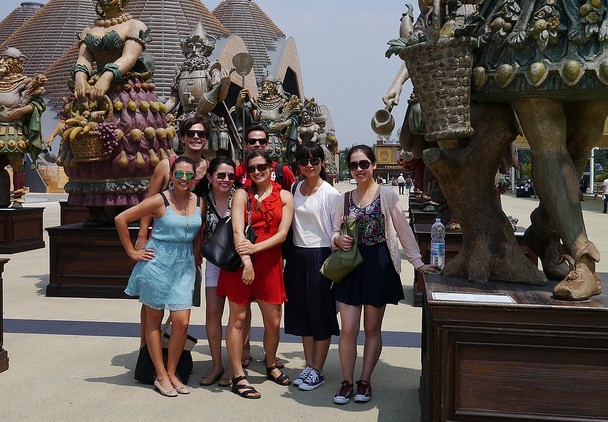
Lab participants collaborate as multidisciplinary teams to address a particular project identified by the client in the host country. Students analyze information pertinent to the project and its context, then produce a set of recommendations for accomplishing project objectives. This usually takes the form of policy recommendations, a suggested plan or alternative plans, databases, background information, various maps and graphics. Local agencies and firms often sponsor a laboratory to obtain invaluable research, design and analysis. And community groups seek assistance from laboratories/workshops to obtain analytical data and recommendations otherwise unavailable.
As participants transition from the classroom to an international setting, they benefit from the experience of translating professional practice in a cross-cultural context. While some background research and preparation is necessary prior to leaving the U.S., the bulk of the intensive assignments take place in the field. On-site work culminates in a presentation to the client.
USC Price International Labs encourage participation from students in any Price graduate program. The Labs provide a distinctive opportunity to build credentials and experience, while building a global network of professional contacts.
Learn more about USC Price’s International Labs:
Italy International Lab 2023
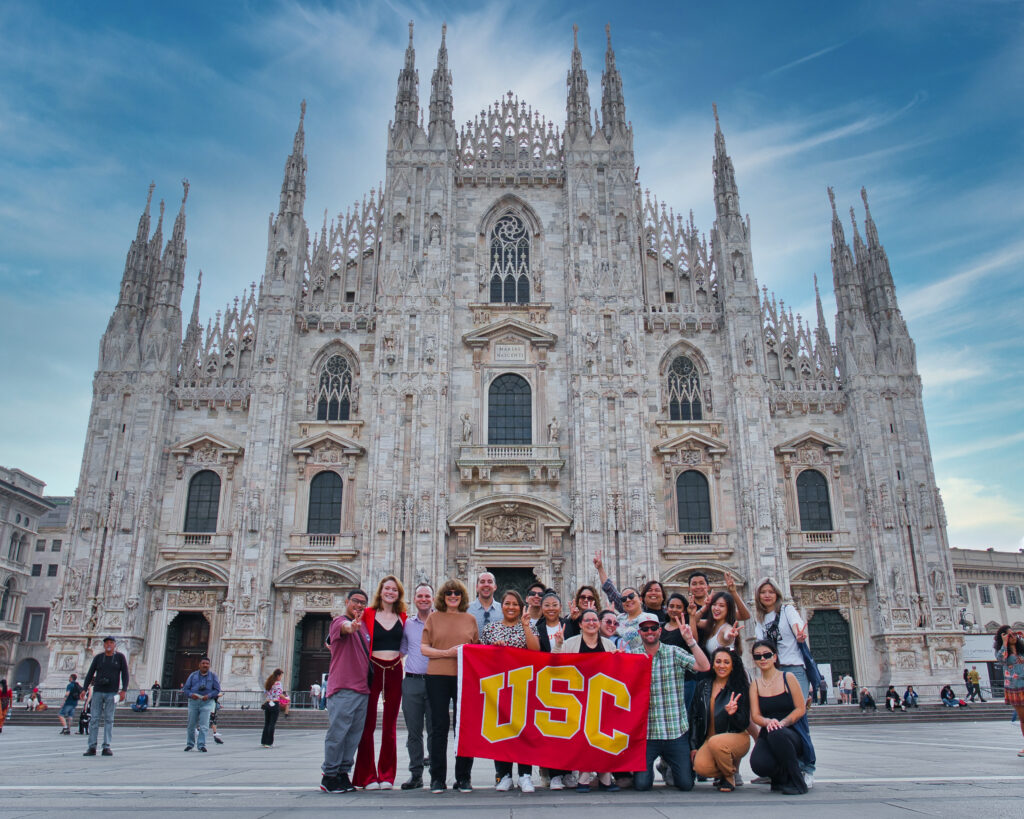
Location: Milan, Italy
Dates: May 22– June 2, 2023
Partner: Bocconi University
Instructor: Dr. Elizabeth Graddy
Topic: Public Private Partnerships
Syllabus
Bocconi Syllabus
Italy International Lab 2019
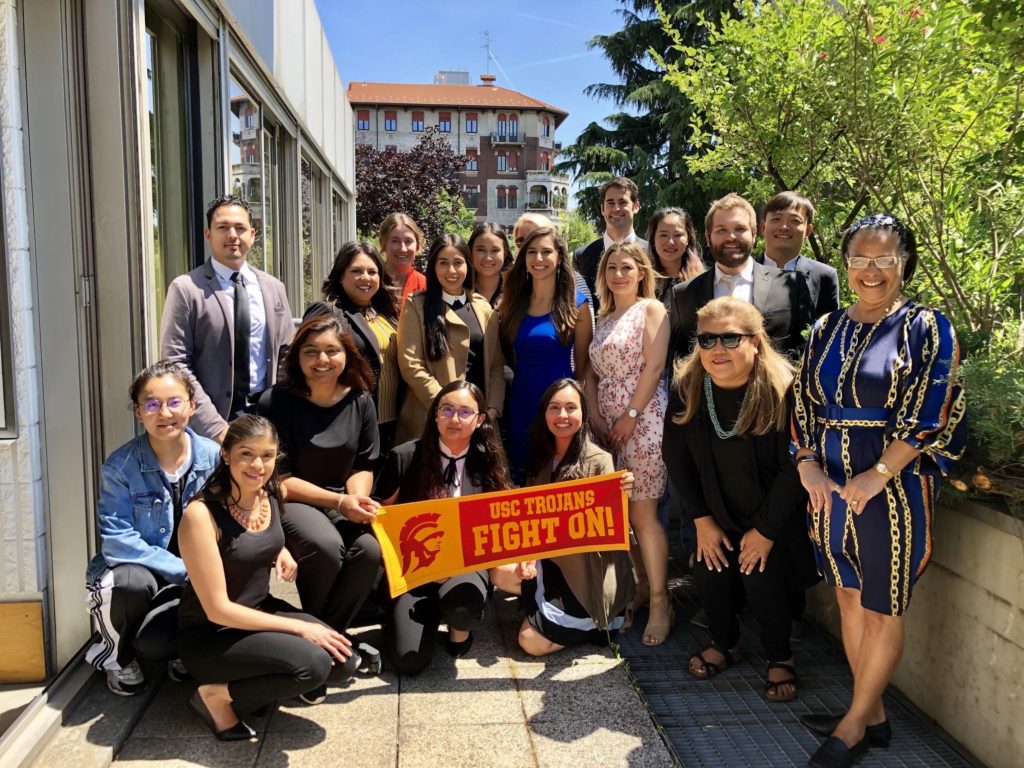
Location: Milan/Rome, Italy
Dates: May 19– May 31, 2019
Partner: Bocconi University
Instructor: Professor LaVonna Lewis Topic: Youth & Social Justices
Description: The 2019 international lab in Milan, Italy included 18 students from our Price school. Guided by Professor LaVonna Lewis and our partner, Bocconi University, the students made a close examination on youth development and social justice. A particular emphasis was placed on how efforts in these areas taken in the United States might inform or compare with efforts spearheaded by local authorities in Milan. To have a better understanding of the issue, they visited multiple sites in both public and private sectors and talked to specialists from local government and service providers.
More resources:
China International Lab, 2019
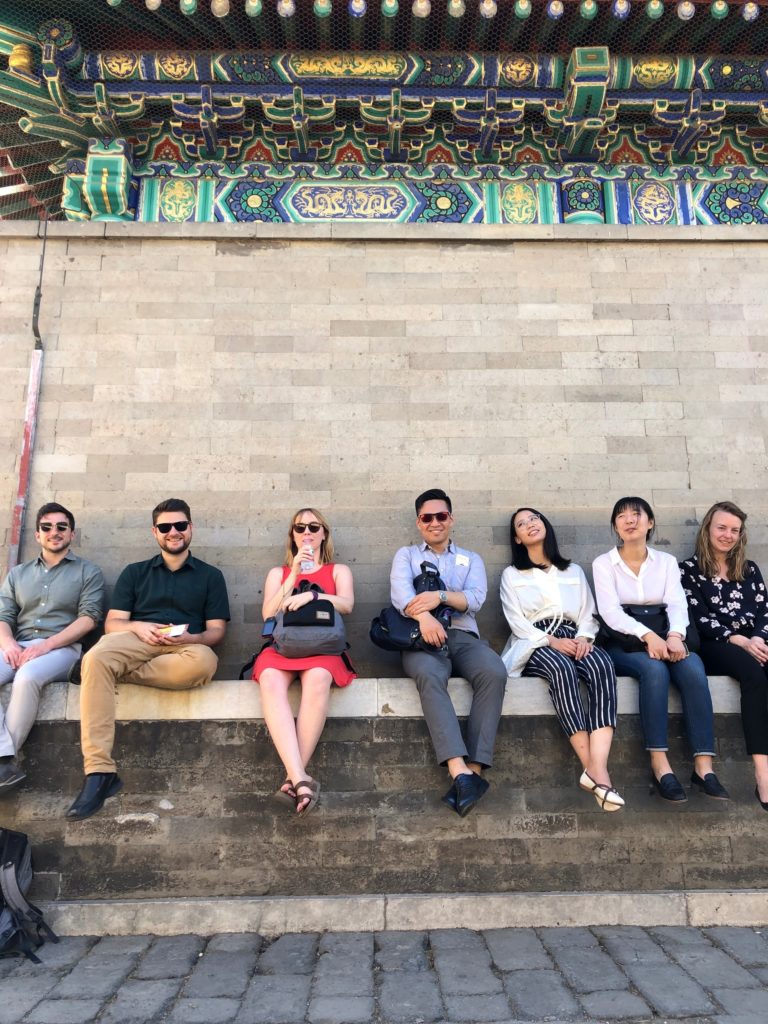
Location: Beijing & Danzhai, China
Dates: May 19– May 31, 2019
Partner: Wanda Group
Instructor: Professor Antonio Bento
Topic: Poverty alleviation in Danzhai, China
Description: The 2019 China Lab in Beijing and Danzhai included 21 students from different programs at Price. The consulting team was guided by Professor Antonio Bento to provide a sustainable development strategy for one of the biggest Chinese Corporation, Wanda Group in a poverty alleviation project they operate in Danzhai, Guizhou Province. In the first week in Beijing, the team visited Novartis China, Beijing Planning Exhibition Hall, Environmental Defense Fund and Renmin University of China to gain a better understanding of Beijing city planning as well as climate initiative and climate corps in China. Then accompanied by Wanda staff, the team made a field trip to Danzhai for a first-hand observation of current operations of Wanda Danzhai Poverty Alleviation Project from the perspective of eco-tourism, social entrepreneurship, local higher education, and cultural preservation. Once in the region, students conducted interviews with residents, local business owners, and tourists to broaden their practical understanding of Wanda’s operations, and thereby identifying areas for future improvement.
All the insights acquired from site visits and immersive experience in both Beijing and Danzhai deepened and broadened students’ understanding of the issue and culminated in their comprehensive package of recommendations. In the final presentation, they made a highly professional analysis of the current operation in Danzhai Wanda Village. The dissection gave further recommendations on boosting the sustainable development while further advancing Wanda’s imperative corporate social responsibility.
In their report, they further elaborated on the recommendations that encompass both the demand and supply side of the Danzhai economy, with proposals for entrepreneurship capacity building, and a community stakeholder dialogue mechanism.
Argentina International Lab 2019
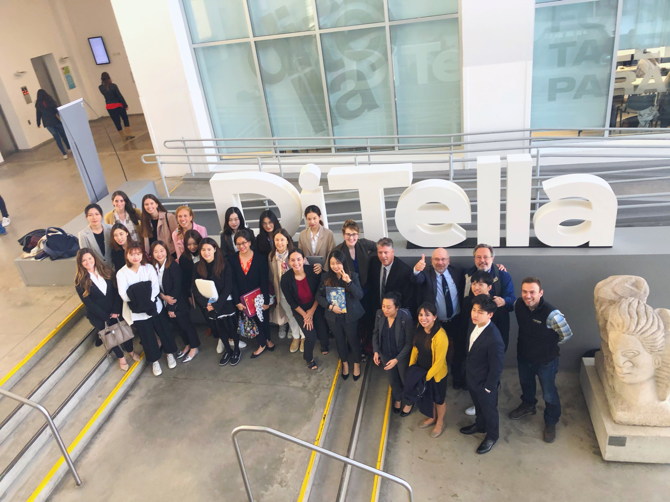
Location: Buenos Aires
Dates: May 19– May 31, 2019
Partner: Universidad Torcuato Di Tella.
Instructor: Professor Eric Heikkila
Topic: Local governance & housing outcomes
Description: The 2019 International Lab in Argentina included 21 students from our MPA, MPP and MPL programs, with a few of the students from the USC Sacramento Center and the Online MPA program joining as well. This lab is focused on addressing informal settlements within the metropolitan area of Buenos Aires (MABA). Students were able to work with experts and professionals in related fields to learn the current issues facing Argentina and endeavor to raise potential innovations addressing concerns over the informal housing in this region. With the support of Professor Eric Heikkila, students attended lectures on urban planning and housing solutions in Argentina. Besides, during two site visits within CABA and GBA, regional governance clients provided students with instructions to humanity habitat and housing markets. After engaging with stakeholders, students made efforts to discuss potential solutions that prevent future informal housing issues from four perspectives: land use, transportation and infrastructure, employment and income, and governance. They made a final report which outlines a theoretical framework and includes successful case studies across the world for further context and policy consideration. Student teams offer recommendations that the city should adapted to a polycentric model and develop satellite cities around the AMBA area with the assistance of transit-oriented development, workforce development hubs, and metropolitan planning organizations.
Italy International Lab, 2018
Location: Milan, Italy
Dates: May 21st – June 1st
Partner: Bocconi University
Instructor:Professor Michael Nichol
Topic: Health Tourism
Description: The 2018 International Lab in Milan, Italy included 19 students from the MPA, MPP, MHA and IPPAM Programs at Price School. While in Milan, the students under the guidance of Professor Mike Nichol and our partner, Bocconi University analyzed the current issues facing Milan in terms of successful healthcare ventures. At the end of the lab, the team presented a comprehensive report to improve the overall quality of life of the Italian people by recommending policies that can improve regional gaps in the economy, efficiency and effectiveness of care.
China International Lab, 2018
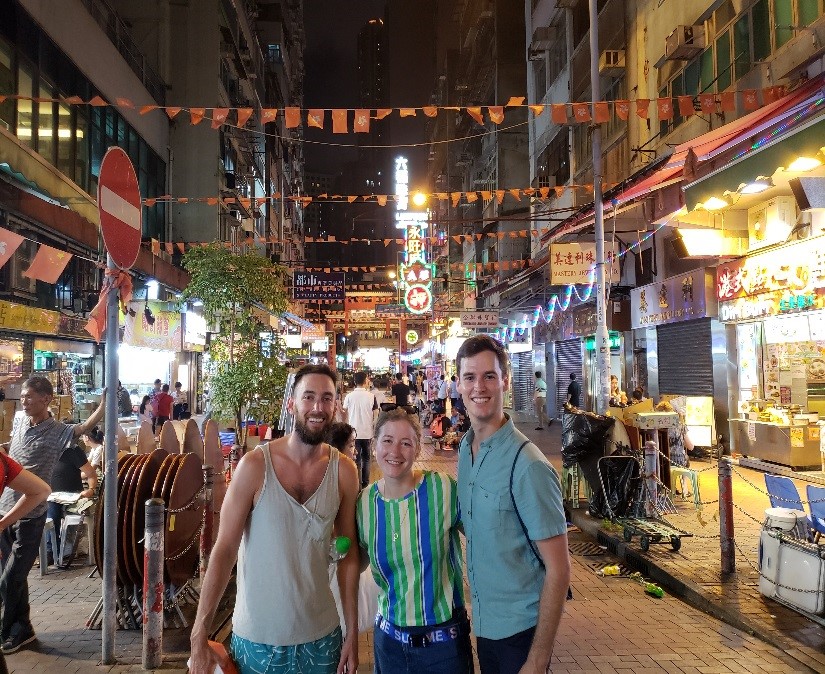
Location: Hong Kong, China
Dates: May 21st – June 1st
Partner: Hong Kong’s MTR
Instructor:Professor Marlon Boarnet
Topic: Regional transportation integration
Description: The Hong Kong lab used transportation as a lens to study the territory’s integration with China. The students began with a focus on regional transportation integration. This included
- a soon-to-open high speed rail line in West Kowloon, which will connect Hong Kong to Shenzhen and the rest of China via the country’s vast, and rapidly growing, high speed rail network.
- The HSR station, with an anticipated cross-border ridership of over 100,000 persons per day, will be an important link from Hong Kong to the mainland – rivaling the cross-border traffic at the airport. Regional transportation integration is broader than the HSR station, and the issues go beyond transportation.
- The South China region – Hong Kong, Shenzhen, Guangzhou, and Macau – are part of a region that includes financial, technology, and entertainment hubs. Integrating transportation across the region brings the potential for new economic relationships, and poses political questions.
The team worked with several entities in Hong Kong, including the MTR (which builds and operates the territory’s extensive passenger rail system) and planning and regional development study groups. At the end, the team presented a comprehensive report that offers holistic recommendations that suggest avenues for leadership across a range of institutional levels and affect MTR, Hong Kong, and the GBA.
China International Lab, 2017
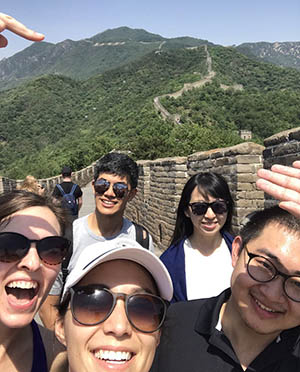
Location: Beijing China
Dates: May 22– June 2, 2017
Partner: World Bank, China
Instructor: Professor Marlon Boarnet
Topic: Air Quality Management in the Jingjinji Region
Description: The 2017 International lab in Beijing included 18 students from different programs (MPP, MPA, Online MPA, MPL, MHA, and IPPAM) here at Price. The team worked under the guidance of Professor Marlon Boarnet along with our partner institute – World Bank, Beijing, to provide a set of recommendations and advice on how to improve air quality management in the Jingjinji region of China. The team visited several top institutions and receive lectures from scholars and leaders from Peking University, Lincoln Institute Center for Urban Development and Land Policy, Beijing Transportation Research Institute, China Academy of Urban Planning and Design, Atkins and China Academy of Sciences.
In their report, the team evaluated few of the key sectors – land use, industry, transportation, and energy; the sectors most affected by increasing air pollution levels in China. Based on the preliminary analysis and site visits, the team presented a set of recommendations focusing on policies, technologies, and collaborative governance.
The report offered short-term and long-term structural change proposals to ameliorate air pollution and improve the overall livability factors for residents within the Jingjinji region. The report also presented an opportunity for the students to do a comparative analysis between the Chinese and American context to provide a comprehensive, potential model for collaboration and policy initiatives. The report and the presentation were very well received and hopefully it would help to drive future policy measures, economic growth and environmental protection in the Jingjinji region.
Italy International Lab, 2017
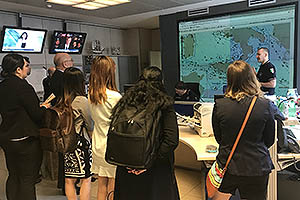
Location: Milan/Rome, Italy
Dates: May 22 – June 2, 2017
Partner: Bocconi University
Client: Department of Civil Protection
Instructor: Professor Eric Heikkila
Topic: A Comprehensive Analysis and Action Plan on a Social Media Strategy for Disaster Response: Risk Mitigation
Description: The 2017 International Lab in Milan, Italy included 7 students from 4 different programs (MPP, MPA, MPL, and IPPAM) here at Price. While in Milan, the students under the guidance of Professor Eric Heikkila and our partner, Bocconi University analyzed the current issues facing Milan in terms of Emergency management and Disaster response. The students were able to attend lectures at the Bocconi University, where they received active feedback from Professors Veronica Vechi and Raffaella Saporito throughout the project. Professors Vechi and Saporito offered the students an essential understanding of the key political and social structure within Milan, and Italy in general.
At the end of the lab, the team presented a comprehensive report to Italy’s Department of Civil Protection (Dipartimento della Protezione Civille, or DPC), focusing on a set of innovative solutions to increase the social media presence within the existing network design to create more connectedness between crucial disaster response stakeholders.
Along with the advantages of having wider social presence and use of technology for disaster response and emergency management, the reports also identify legitimate concerns and liabilities related to social media. It offers a comprehensive set of solutions to mitigate or combat some these issues to create a robust social media system that has great potential to assist officials and responders during emergencies and disasters. The presented action plan was very well received and greatly appreciated by both Bocconi University and the Department of Civil Protection.
Brazil International Lab, 2017
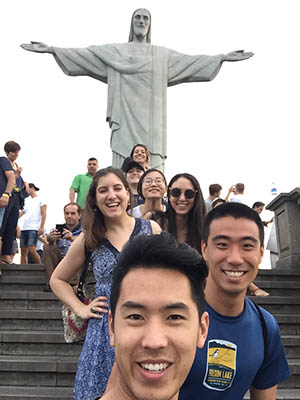
Location: Rio De Janeiro, Brazil
Dates: May 22 – June 2, 2017
Client: Centro de Operacoes-Rio or the Center of Operations (COR)
Instructor: Professor Antonio Bento
Topic: Big Data to Smart City
Description: The 2017 International lab in Rio de Janeiro included 12 students from different programs (MPP, MPL, Online MPA, IPPAM, and the IPP Certificate) here at Price.
The team worked under the guidance of Professor Antonio Bento along with our client institute – Centro de Operacoes-Rio or the Center of Operations (COR) to provide a set of indicators and recommendations on how to improve the efficiency and effectiveness of COR’s smart technology infrastructure. Doing so would ultimately enhance Rio de Janeiro’s city resilience to climate change, natural disasters, mobility, and public safety management in Rio de Janeiro, Brazil.
The team visited several public institutions and received presentations from leaders and staff from the Integrated Center of Command and Control, Rio Aguas, Military Fire Department, and the Civil Defense. This helped provide insight to the team to assess the capabilities of COR’s public entity partners. Based on the team’s preliminary analysis and site visits, the team was able to present to COR a set of indices with various indicators that evaluated the city’s overall resilience, vulnerability to different hazards, and smart city capabilities within Rio de Janeiro. Alongside that was the formation of a communication strategy and a project/partnership implementation timeline.
The final report included further information about the three indices (city resilience, hazard vulnerability, and smart city capabilities) that included lists of indicators as a means to articulate COR’s value to external stakeholders (such as state and federal agencies, the public, and private donors) as well as a way for COR to internally evaluate itself. Furthermore, the communication strategy showed potential outreach events and opportunities that COR could use to further crowdsource information and alert the public regarding significant disasters or events on a faster real-time basis. Lastly, the project/partnership implementation timeline showed a realistic timeline of how to customize, use, and communicate indices’ to stakeholders as well as enhance data-sharing partnerships. Overall, the report and the presentation were very well received and hopefully it will help to drive future smart city initiatives, infrastructure changes, public safety, and climate change resilience measures in Rio de Janeiro.
China International Lab, 2016
Location: Fuzhou, China
Dates: May 23 – June 3, 2016
Partner: Fuzhou University
Instructor: Professor Eric Heikkila
Topic: Disaster Resilience in Fuzhou, China
Description: The 2016 International lab in Fuzhou included 6 students from both the MPP and MPA programs here at Price. The team worked with scholars and professors from our partner, Fuzhou University, and their school of Economics and Management to help provide recommendations and advice on how to best approach emergency preparedness in the region. While in China the team was able to visit multiple emergency preparedness sites and hear from leaders at the Fujian Earthquake Administration, the Flood Control and Drought Relief Command Center, and Safety Bureau of Fujian.
In their report, the team evaluated and researched vulnerable populations in the region, collected information from locals and officials, and explored the utilization of technology in emergency situations.
The report presented was comprehensive and allowed for the students to showcase how the American context and policy can inspire meaningful development and planning across the world.
Brazil International Lab, 2016
Location: Fortaleza, Brazil
Dates: May 23 – June 3, 2016
Client: Alphaville Foundation
Instructor: Professor Gary Painter
Topic: Housing and Social Innovation in Brazil
Description: The 2016 International lab in Brazil comprised of 14 students from four different programs here at the Price School (MPA, MPP, MPL, IPPAM). The group of students worked as a consulting team to provide the Alphaville Foundation, which develops social projects in areas where urban projects are developed, with recommendations and ideas on how to provide social enterprise services to Alphaville Urbanismo new development in Eusébio, Brazil. The team of students was able to meet and hear presentations from stakeholders from Alphaville Urbanismo, Alphaville Foundation, and even the Mayor’s Office to learn about the social issues that can arise when development projects are undertaken.
This lab also included site visits to four different local communities to get a first hand look at the lives and environments of locals to get a better idea of how to address the issues surrounding them. The team worked to develop a report and presentation that outlined all the different aspects associated with the development of a social enterprise in a community. They addressed specifics such as identifying opportunities and need, potential financial models, and how to monitor and evaluate projects to ensure they are producing the desired results. Along with producing information on the development of social enterprises solutions, the group presented examples of possible programs to implement like a Community Garden-Nursery and Community Retail Hub that would produce a mutually beneficial relationship between developers and the community.
Italy International Lab, 2016
Location: Milan, Italy
Dates: May 23 – June 3, 2016
Partner: Bocconi University
Instructor: Professor Antonio Bento
Topic: Addressing Air Pollution in Milan, Italy
Description: The 2016 International lab in Milan, Italy included 25 students from our MPA, MHA, MPP, MPL and IPPAM programs, with a few of the students from the USC Sacramento Center and the Online MPA program joining as well. While in Milan students were able to work with our partner, Bocconi University, to learn about the current issues facing the city of Milan and the Greater Po Valley. The focus of the lab was to address the rising concerns over air pollution in the region. The students conducted multiple site visits to local stakeholders in preparation for their presentation, as well as a trip Venice where Professor Veronica Vecchi lead them on a visit of transportation authority there.
Besides engaging with the stakeholders students also attended lectures at Bocconi University, where Professor Vechi was able to teach the students more about the Italian context and the different political and social structures in place within Milan and more broadly in Italy. Their final report and presentation discussed a few alternative solutions that could be implemented in the city to reduce traffic congestion, one of the main contributors of air pollution in the city. Some of the covered policy solutions were Active Demand Management, Active Traffic Management, and Dynamic Parking Management. The team’s presentation went very well and will hopefully guide policymakers in the region to more practical and effective policy efforts in the near future.
China International Lab, 2015
Location: Beijing, China
Dates: May 25 – June 5, 2015
Partner: Taikang
Instructor: Professor Mike Nichol
Topic: Senior Continuing Care Retirement Community (CCRC)
Description: The 2015 International lab in Beijing included 19 students from five programs at Price (MHA, MPA, MPL, MPP, and IPPAM). The consulting team was retained to provide Taikang, the third largest life insurance company in China, with advice regarding their new Continuous Care Retirement Center named Yan Gardens. The company sought information management and operations, marketing, comparisons with CCRCs in other developed countries, and the use of social media in senior care. The lab included site visits to eight nursing homes, assisted living facilities, rehabilitation hospitals, general hospitals, and CCRCs. In addition, the team heard presentations from a health economist providing advice to the state committee on health reform, as well as a government minister responsible for health services research and senior care. The team’s final report and presentation was very well received, and the company expressed interest in continuing the association with the Price School.
Brazil International Lab, 2015
Location: Rio de Janeiro, Brazil
Dates: May 25 – June 5, 2015
Client: INEA – Instituto Estadual do Ambiente (Rio de Janeiro State Institute of Environment)
Partner: Fundacao Getulio Vargas (FGV) International Affairs Division (DINT)
Instructor: Professor Eric Heikkila
Topic: Kick Starting Water Reuse: Legislation and Policy Options for Rio de Janeiro
Description: The 2015 Brazil lab consisted of 9 master students from the Price school and was organized on conjunction with FGV DINT. The student consultant group was retained by INEA to provide policy recommendations that help alleviate the severe drought and water shortage faced in Brazil. Students met with FGV DINT scholars, water managers, and members of INEA, the Rio de Janeiro State Institute of Environment.
Stakeholders from the public, private, and academic sectors came to the students’ final presentation on water use policy. Included in the presentation audience was Mr. Jorge Barros, Senior Vice President with SIEMENS Brazil Ltda, a multinational leader in energy technologies. In addition to the presentation, students produced a formal report that will be translated into Portuguese and distributed to state-level environmental policy makers. The group’s work was featured in the May/June 2015 USC Brazil Newsletter.
Italy International Lab, 2015
Location: Milan, Italy
Dates: June 8– June 19, 2015
Partner: SDA Bocconi School of Management
Instructor: Professor Elizabeth Graddy
Topic: Private-Public Partnerships and Management and Procurement
Description: The 2015 International Lab in Milano included 14 Price graduate students from our MPA and IPPAM programs. MPA students based in Los Angeles, Sacramento and in our online program participated. Our partner, Bocconi University, provided lectures and workshops on public-private partnerships in Italy, public procurement practices in the EU, and social impact investing, as well as facilities and expertise in support of the projects. Luciano Balbo, a pioneer in impact investing in Europe and founder of Oltre Venture, one of the first funds backed by the European Investing Fund, met with the class to share his vision for the future of this still relatively new instrument for social innovation. The students also attended Expo Milano 2015, which focused on policies to feed the planet.
After site visits and presentations by our two regional governance clients, ARCA and Finlombarda, the students researched and then provided advice on two sets of public management issues. ARCA, the regional central purchasing authority for the Lombardy region, asked for help in implementing a new hub-spoke procurement system to support t municipal governments in the region, and in developing a scheme to identify which types of goods and services should be purchased centrally versus locally. Finlombarda, a public financial firm, asked for help on determining what kinds of PPP models would be most useful in providing sports facilities, schools and other local infrastructure needs to communities in the Lombardy region, and in suggestions about the role Finlombarda could play in the implementation of effective PPPs. The teams offered creative and useful suggestions to both clients, via a formal presentation to agency decision makers and a written final report.
China International Lab, 2014
Location: China (Hong Kong)
Dates: May 26 – June 6, 2014
Partner: Hong Kong American Center
Instructor: Professor Eric Heikkila
Topic: “One Metropolis; Two Systems”
Description: The USC Price School has conducted its China Lab each year for the past decade, with a range of clients and collaborating institutions. This year the Lab collaborated with the Hong Kong America Center and other institutional partners in the region, including the HK University of Science and Technology, East West Bank, Civic Exchange, World Green Organization, Policy Research and Advocacy of Hong Kong Council of Social Services.
The Lab was structured to address various aspects and challenges that Hong Kong, the metropolis, is facing. Issues discussed include:
- Economy
- Housing and Social Service: Hong Kong real estate is an attractive investment for many Mainlanders seeking a safe place to “park” accumulated financial capital. Consequently, housing prices in HK have sky-rocketed.
- Environment: water and air pollution know no borders, so the obstacles to effective coordination and action are indeed formidable
- Transportation: Cross-border flows of people and goods continues to grow exponentially, placing considerable strain on transportation infrastructure linking HK to the PRD.
During the two-week intensive class in Hong Kong, students met with scholars, policy practitioners and business experts from various institutions as well as conducted site visits. Students’ final report, titled “One Metropolis, Two System”, a contextual policy recommendation report for enhanced metropolitan cooperation between Hong Kong and Shenzhen, was well received among panelists who were invited to the final presentation.
Ireland International Lab, 2014
Location: Ireland (Dublin)
Dates: May 26 – June 6, 2014
Client: Dublin City Planning Department
Partner: University College Dublin and Dublin City Council
Instructor: Professor Dora Kingsley Vertenten
Topic: “#SmithfieldSays: A Comprehensive Campaign and Strategy to Facilitate Public Realm Conversations Using Social Media”
Description: The USC Price International Lab is a flagship overseas study program which attracts USC Price students from different majors. There used to be two Price International Labs each year. This year we have offered three. We have expanded our footprint to Europe in Dublin, Ireland. The Lab offered there focused on leveraging social media to help mobilize local citizens and stakeholders in civic space revitalization.
Students met with Dublin city council members, city manager, city chief planner, scholars from University College Dublin and public policy team members at Google. During the Lab period, the US Embassy invited our students and hosted a meeting on site.
Approximately sixty participants such as city officials, scholars and local practitioners attended students’ final presentation on social media demonstration project. In addition to the presentation, students produced a more than 300-page report, incorporating a mixed methodology (literature review with communications modeling and case studies), smart practice review and social media campaign. The report also included semi-structured interviews along with the documented results from both the Twitter campaign and the “ground” campaign of public engagement. The social signage for #SmithfieldSays demonstrated the influencers and engagement obtained with the Dublin City Council and @USCinDublin Twitter campaign.
Brazil International Lab, 2014
Location: Sao Paulo, Brazil
Dates: January 2-10, 2014
Partner / Client: Empresa Paulista de Planejamento Metropolitano (EMPLASA—the metropolitan planning agency representing the State of Sao Paulo)
Instructor: Professor Richard Green
Topic: Housing Provision for Working Class Paulistanos
Description: The Sao Paulo Lab was structured accordingly to address various aspects of land use. Issues that were addressed include:
- Municipal Structure – Are land use and housing plans better developed at the metropolitan level or at a more devolved level of government.
- Bulk requirements – How much density should Sao Paulo strive for? How tall should buildings be? What should floor-area-ratios be? How large should units be?
- Infrastructure finance – Should Sao Paulo use value capture methods? As valorem property taxes? Impact fees? User fees? Other taxes?
- Formalizing housing – Why do so many people live in the informal housing sector. Should Sao Paulo strive to formalize it? Provide better services to it? Encourage people to leave it?
- Housing and access to employment – Do people live near jobs? If not, is it better to encourage people to move or jobs to move?
Students were divided into five teams to address such issues, drawing on cases studies from New York, Chicago, Singapore, Hong Kong and Seoul and presented final presentations on housing policies to EMPLASA.
China International Lab, 2013
Location: China (Hong Kong)
Dates: May 27 – June 7, 2013
Partner: Hong Kong American Center
Client: Better Hong Kong Foundation
Instructor: Professor Eric Heikkila
Topic: “One Metropolis; Two Systems”
Description: The students in this year’s International Lab in Hong Kong undertook a rather creative twist on the traditional Lab format. Rather than producing a written report to present to the client, their final “deliverable” was in the form of a film documentary. This was made possible because one of the students, Mark Wolf, is a professional film documentary producer, having worked for the White House, the Governor’s office in Hawaii, and elsewhere. The students worked in six teams, corresponding to the key sectors impacted by the “One Metropolis; Two Systems” issue in Hong Kong. These six teams undertook reviews of relevant academic literature, interviewed experts in HK and elsewhere, and did on the ground field research while in HK. The also compiled relevant video clips of related materials. Each team then wrote a script that was narrated into a “voice over” for the film. We worked as a group to design the overall architecture of the documentary, and then Mr. Wolf took the assembled materials and made it into a reality. The “world premier” of this film was then presented to our client, the Better Hong Kong Foundation, on the final day of the Lab.
Brazil International Lab, 2013
Location: Rio de Janeiro, Brazil
Dates: May 27 – June 7, 2013
Partner: Fundação Getulio Vargas (FGV), Rio de Janeiro
Instructors: Professors Frank V. Zerunyan, Jonathan Speier
Topic: The Porto Maravilha Development
Description: The project for the 2013 Brazil Lab builds on the previous year’s lab, which analyzed the issues and challenges facing the city of Rio de Janeiro as officials preparing to host the 2014 World Cup and the 2016 Olympic games.
The purpose of this year’s Brazil Lab was to generally look at the infrastructures of the City of Rio de Janeiro and explore innovative methods of rebuilding Rio for the 21st Century. 2013 Brazil Lab focused on governance vis-à-vis the forms of interactions across public, nonprofit, and for profit sectors.
Students were asked to consider the following key dimensions in developing a strategic framework to guide Rio de Janeiro’s redevelopment: finance, transportation, social services, environment, safety and security, and development of a lasting legacy with an eye toward how Rio can market itself in coming years to increase international interest in visiting the city. They presented a final presentation to the client, called “Porto Maravilha Development”. Students also finished a written paper, which studies five areas within Porto Maravilha that offer prime opportunities to integrate principals of transit-oriented development. The five areas include: 1) Rodoviaria bus terminal, 2) Central do Brazil regional train station, 3) pedestrian access in the Uruguaiana shopping district and central subway stations, 4) Waterfront Access & Water Transit, and 5) cruise ports. Each of the areas includes precedent case studies that further the argument for greater TOD implementation.
China International Lab, 2012
Location: China (Ningbo)
Dates: May 27 – June 8, 2012
Partners: Port of Ningbo; Port of Zhoushan; Ningbo University of Technology; Zhoushan Ocean University; Meisha Ocean University; Meisha Island Administrative Committee; Port of Long Beach
Instructor: Michael Vanderbeek
Topic: International Trade and Local Development: Comparing Benefits and Impacts on Both Sides of the Pacific
Description: The 2012 China international lab helped students to:
- Understand first-hand the different benefits and impacts associated with international trade and global goods movement as well as where, how and to whom these benefits and impacts are distributed in two entirely different international contexts.
- Gain experience in researching and gathering data relevant to international policy, planning and development, and in using the findings to diagnose real-world problems and recommend meaningful solutions.
- Understand and be able to compare and contrast the role that two of the world’s premiere port complexes play in the development and path dependency of the economies of their respective regions and identify best practices that each can learn from the other.
- Gain a working knowledge of the various sectors and agencies of government in both the U.S. and China that drive and/or dictate international trade policy, and how private-sector interests interact with government agencies to influence and implement such policy.
- Understand the unique opportunities and special challenges that port cities/regions face in the areas of policy, planning, and development – specifically land use, economic development, and environmental policy and planning – and contribute ideas that can help shape practical solutions for future improvement for both U.S. and Chinese trade-impacted regions in terms of increased system efficiencies, mitigated impacts, more sustainable operations and improved local quality of life.
Brazil International Lab, 2012
Location: Rio de Janeiro, Brazil
Dates: May 21 – June 1, 2012
Partner: The Brazilian School of Public and Business Administration (EBAPE), the Fundação Getulio Vargas (FGV)
Clients: Alberto Gomes Silva, Special Advisor to the President, CDURP, Companhia de Desenvolvimento Urbano da Região do Porto do Rio de Janeiro (Urban Development Area of the Port of Rio de Janeiro)
Instructors: Professors Frank V. Zerunyan, Jonathan Speier
Topic: Revitalizing Port Maravilha
Description: The 2012 Price School International Lab to Brazil was a two-part course. During the spring semester, the class met weekly at the Price School to develop research, hone presentation skills, and prepare for a consulting project in Brazil. During this time, students explored the known facts about the clients’ project, the Porto Maravilha redevelopment in Rio de Janeiro, Brazil. They used policy and urban planning examples from cities around the globe, anticipating both shortcomings and opportunities for port redevelopment in Rio. The Olympic Games upcoming in 2016 is a milestone for which Porto Maravilha stands to be a legacy. With that, the students surveyed redevelopment efforts of host cities of mega-sporting events.
The summer session was a hands-on, two-week lab in Rio de Janeiro. Teaming up with Brazilian university FGV, students learned from a host of local experts, politicians, and social welfare advocates. They developed further insight into the Porto Maravilha project – as well as it’s context within Rio and Brazil – from lectures, continued research, and on-site field work. USC Price students also had the opportunity to work side-by-side with Brazilian master’s students interested in the policy and planning work; students who shared with us local perspectives. They presented their findings and recommendations to the Director of the Porto Maravilha project. An ongoing collaboration continues between the project, FGV, and USC.
China International Lab, 2011
Location: China (Hong Kong, Shenzhen and the Pearl River Delta)
Dates: May 23-June 3, 2011
Partner: The Party University of Shenzhen
Client: The Public Administration Institute of Shenzhen
Instructor: Professor Mark Pisano
Topic: Policy Options for Transitioning away from Export-Lead Growth in Southern China’s Pearl River Delta
Description: Shenzhen and the Pearl River Delta are two of the most productive regions in China. Shenzhen is considered a key center of the export economy of the country. For this year’s project, the client in Shenzhen requested that the International Lab developed a set of policy options to promote regional cooperation in transitioning from an industrial manufacturing base to one that is more diversified and expedites the process of expanding the domestic market. A side-benefit of these strategies was that it was expected that decreasing the manufacturing base would lower demand for energy and consumption of natural resources and improve air quality and the quality of life.
Brazil International Lab, 2011
Location: Rio de Janeiro, Brazil
Dates: Late May and early June, 2011
Partner: The Brazilian School of Public and Business Administration (EBAPE), the Fundação Getulio Vargas (FGV)
Client: The Special Secretary for World Cup 2014 and Olympics 2016 (the Municipal agency responsible for the two Mega Sporting Events in Rio) represented by Mr. Ruy Cezar
Instructors: Professors Frank Zerunyan and Jonathan Speier
Topic: 2016 Olympics in Rio de Janeiro, Brazil
Description: The project for the 2011 Brazil Lab was built on the previous year’s lab, which analyzed the issues and challenges facing the city of Rio de Janeiro as officials prepare to host the 2014 World Cup and the 2016 Olympic Games. Students in last year’s lab assessed the experience of seven previous Olympic cities weighing the positive and negative consequences and formulated a set of lessons learned that could be useful to Rio’s city officials. Students in this year’s Lab developed a strategic framework to guide Rio de Janeiro’s preparations to host the 2016 Olympic Games and to manage effectively the influx of hundreds of thousands of international visitors coming to Rio before, during, and after the Games are going to be held. Students discussed nine key dimensions in developing a strategic framework to guide Rio de Janeiro’s preparations: finance, transportation, social, environment, safety and security, basic needs, information, administrative, and development of a lasting legacy with an eye toward how Rio could market itself in coming years to increase international interest in visiting the city.
China International Lab, 2010
Location: China (Hong Kong and Foshan)
Dates: May 24 – June 4, 2010
Partner: Hong Kong American Center
Client: Foshan Municipality
Instructor: Professor Eric Heikkila
Topic: Comprehensive remediation of the Fengjiang River
Description: The class advised local government officials in Foshan on implementation issues arising in the context of Foshan’s ongoing efforts to undertake comprehensive remediation of the Fengjiang River, including implementation of recommendations.
The class organized itself to address five principle challenges that Fengjiang River was facing:
- Administrative structures
- Mobilization of stakeholders
- Organization capacity
- Monitoring & evaluation
- Socio‐economic context
Students learned about the processes of urban development in China, the workings of various sectors of government, how opportunities for private sector involvement and investment are structured, the role of the World Bank in development projects, and the role of professional non-governmental organizations
Through the collaborative efforts, students gained a greater understanding of how to function as part of team and how to resolve organizational issues within the team as well as gain insights into their individual strengths and what they can contribute to a team effort.
Brazil International Lab, 2010
Location: Rio de Janeiro, Brazil
Dates: May 31-June 11, 2010
Partner: Brazilian School of Public and Business Administration (EBAPE), the Fundação Getulio Vargas (FGV)
Client: Special Secretary for World Cup 2014 and Olympics 2016 (the Municipal agency responsible the two Mega Sporting Events in Rio)
Instructors: Professors Peter Robertson and Jonathan Speier
Topic: Planning for the 2016 Olympics in Rio de Janeiro, Brazil
Description: The project for the 2010 Brazil Lab focused on Rio de Janeiro’s preparations to host the 2016 Olympic Games and to manage effectively the influx of hundreds of thousands of international visitors coming to Rio before, during, and after the Games are going to be held. In the 1-unit spring preparatory class, student groups conducted research on the steps taken by seven previous Olympic cities to prepare for the Games, as well as the positive and negative consequences of the actions implemented. In Rio, students heard presentations pertaining to most of these issue areas, from a wide variety of academics and practitioners with knowledge of and experience in Rio government and/or business sectors. The students also took field trips to a number of sites of existing and yet-to-be-developed Olympic venues. Given the results of their background research and the information gleaned from the speaker presentations and site visits, the students organized their subsequent analysis to address the issues of transportation, housing, the environment, security, and social development. Their recommendations in these areas were guided by the overarching goal of using the Olympic Games to leave a positive long-term legacy for the city of Rio de Janeiro as a whole.
The students’ final presentation, “Rio Olympic Legacy,” was delivered to the clients in a three-hour session at the end of the Lab. Many of their recommendations were seen by the clients as intriguing and viable, and thus potentially worth implementing.
China International Lab, 2009
Location: China (Hong Kong and Foshan)
Dates: May 25-26, 2009 (in Hong Kong); May 27-June 5, 2009 (in Foshan, China)
Partner: Hong Kong – America Center
Client: Foshan Municipality, Guangdong Province, China
Instructor: Professor Eric Heikkila
Topic: Fengjiang River
Description: Foshan invited the Price International Lab students to assist the Municipality in preparing for an international roundtable forum later 2009, organized by the Pacific Rim Council on Urban Development (PRCUD). During the Lab, students prepared briefing materials that were distributed in advance to international and domestic experts who participated in the PRCUD 2009 Foshan Forum. Before students arrived in Foshan, students had examined case studies featuring river restoration projects from the United States and elsewhere in the 1-unit preparatory course during the spring semester. In this year’s lab, students studied five key issues:
- International experiences regarding river control and urban transformation
- Fenjiang River and socio-economic transformation
- Ecological restoration of the Fenjiang River area
- The potential role of land markets in effecting transformation of the area
- Reconciling renovation and cultural preservation in the Fenjing River area
Brazil International Lab, 2009
Location: Brazil (Rio de Janeiro)
Dates: June 3-15, 2009
Partner: Brasilian School of Public and Business Administration (EBAPE), the Fundação Getúlio Vargas (FGV)
Client: Dr. Marilene de Oliveira Ramos Múrias dos Santos (Dr. Marilene Ramos), President of SERLA – Órgão Gestor de Recursos Hídricos do Estado do Rio de Janeiro (the Managing Organ of Water Resources of the State of Rio de Janeiro)
Instructors: Professors Peter Robertson and Jonathan Speier
Topic: The Complexo Lagunar de Jacarepaguá
Description: 2009 Brazil Lab focused on the Complexo Lagunar de Jacarepaguá, a system of three interconnected lakes in Barra da Tijuca, a growing suburban region in Rio de Janeiro. The project investigated how the quality of water in these lakes could be improved in the near term, while also considering how the long-run development of this area could be conducted so as to insure that the lakes serve as a useful resource to local inhabitants and tourists visiting the area. Students helped address four primary themes:
- Restoring the lakes
- Regional development
- Organization and governance
- Recreation and tourism
China International Lab, 2008
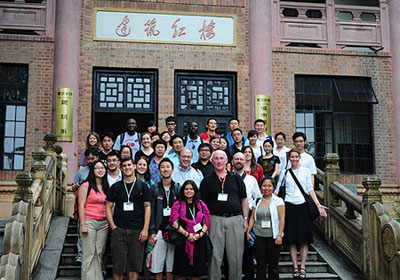
Location: Hong Kong, Guangzhou, and Foshan, China
Dates: May 26 – June 6, 2008
Partner: South China University of Technology
Clients: The City of Foshan represented by Vice Mayor Deng and the Foshan Environmental Protection Bureau represented by Mr. Yang Yongtai
Topic: Water quality of the Fenjiang River in the Pearl River Delta region
Description: China’s unprecedented growth over the past decade has resulted in many benefits, as well as negative environmental impacts to the region. USC Price lab participants collaborated with South China University of Technology students to study the impact of the rapid urbanization of the region and the increased demands from industry on the declining water quality of the Pearl River Delta (PRD). Students researched professional and scholarly journals; reviewed available reports and statistics from the World Bank and others; and conducted numerous briefings and interviews in Hong Kong, Guangzhou and Foshan. Then, they prepared and submitted a formal report to the City of Foshan and the Foshan Environmental Bureau entitled: “A Clean Water Future for Foshan: How the City of Foshan Can Promote Water Quality through Sustainable Land Use Development.” The report assessed the Fenjiang River’s water quality in the PRD region, and suggested means to counteract and reverse the negative trend.
Brazil International Lab, 2008
Location: Rio de Janeiro, Brazil
Dates: June 16 – June 27, 2008
Partner: The Fundacao Getulio Vargas (FGV)
Clients: Secretaria Municipal de Urbanismo and Secretaria Municipal do Habitat (municipal departments of the city of Rio de Janeiro)
Topic: Improved integration of Rio de Janeiro’s squatter settlements
Description: Plagued by drugs, poverty and violence, Rio de Janeiro’s “favelas” (squatter settlements) represent 20-30 percent of the city’s urban population. Participants of the 2008 Brazil Lab analyzed the “slum to neighborhood” or “Favela-Bairro” projects, in which Rio’s municipal government has tried to improve the favelas living conditions by integrating these settlements into the fabric of the city.
Student teams conducted field research and made recommendations on fundamental issues pertaining to the city’s current Favela-Bairro program:
- Reduction of violence and the increase of citizen security
- Operation and maintenance of the water and sewage services
- Control of the urban expansion of the favelas
Student presentations were made and well-received by officials of different city departments and by professors from the Fundacao Getulio Vargas.
China International Lab, 2007
Location: Beijing, China
Dates: May 19 – June 1, 2007
Partner: Beijing University School of Government, Peking University
Client: The Chinese National Committee on Aging (CNCA)
Topic: The impact of China’s social and economic change on the elderly
Description: China is undergoing rapid transformation. The country also has one of the fastest growing aging populations and one of the largest aging populations. Lab participants conducted field research in three urban Beijing neighborhoods to study the lives of China’s elderly. Students sought to answer the question: “What are the intrinsic characteristics of a Chinese elder-friendly community?”
Twenty-seven students from Gerontology, Health Administration, Planning, Public Administration and Public Policy teamed with thirteen students from Peking University to conduct the study. Students worked closely with the World Bank China, the China Research Committee on Aging (CRCA), and the China National Committee on Aging (CNCA), the organization that advises the Chinese government on strategies to address the needs of the aging. Students reviewed policy briefings from the World Bank China, the CNCA, and directors of programs serving the elderly. Students also met with elders as they socialized, shopped, exercised and conducted other daily activities. Upon completion of their field research, participants presented their findings in a final report to officials from the Chinese National Committee on Aging.
Brazil International Lab, 2007
Location: Rio de Janeiro, Brazil
Dates: June 3 – June 15, 2007
Partner: Brasilian School of Public and Business Administration (EBAPE) at the Fundacao Getulio Vargas (FGV)
Client: Dr. Marilene Ramos, president of SERLA
Topic: Water quality and sustainable growth on the Complexo Lagunar de Jacarepagua
Description: The project for the 2007 Brazil Lab focused on the Complexo Lagunar de Jacarepagua, a system of three interconnected lakes in Barra da Tijuca, a growing suburban region of Rio de Janeiro. Lab participants investigated how the quality of water in these lakes could be improved in the short-term and how long-term development could be conducted to insure the lakes serve as a useful resource to local inhabitants and tourists visiting the area. Students addressed four primary themes:
- Lake restoration ― approaches that could reduce lake pollution and improve existing water quality
- Regional development ― plans that support sustainable development in the region
- Organization and governance ― suggestions for the development of effective inter-organizational, cross-sectoral governance mechanisms to better facilitate lake restoration
- Recreation and tourism ― recommendations on how to build tourism in a way compatible with the principles of sustainable development
Students presented their findings and recommendations in a final report and presentation to SERLA, the agency responsible for projects intended to protect the state’s rivers, canals and lakes.
International Labs, 2004-2006
Between 2004-2006, USC Price held International Labs in a variety of locations, including Chongqing and Beijing, China, and Rio de Janeiro, Brazil. Professors Heikkila, Banerjee, Woo, and Speier lead these intensive, field-based, educational experiences. Students were challenged to conduct research and analysis of critical issues that the settings faced, then provide professional-level consulting to address these issues. The labs helped develop the students international awareness while strengthening alliances between USC Price and other international entities.